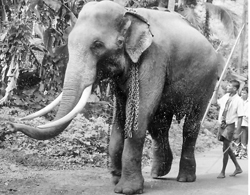|
Environmentalists trample National Policy on Elephants Provisions of the newly-drafted ‘National Policy for the Conservation and Management of Wild Elephants in Sri Lanka’, has come under fire from environmentalists. The committee was appointed by the Environment Ministry and the Wildlife Conservation Department and according to Mammals Instructor Pubudu Weeraratna, among the matters raised was the new concept of Managed Elephant Reserves (MERs) which has been included in the proposed amendment to the Fauna and Flora Protection Ordinance (FFPO).
“How can you base a section of a Policy on an Ordinance that hasn’t even been submitted for approval as yet,” Mr. Weeraratna asked. According to the national policy, MERs are considered to be the conservation areas other than those areas protected under the Department of Wildlife conservation and forests managed by the Forest Department. Therefore, MER’s will essentially comprise privately owned lands which won’t be essentially too conducive for conservation, he added. The relocation of “problem animals” is the next cause for concern faced by environmentalists as there is no specific place demarcated to hold these animals in the event the capacity of a specific Elephant Conservation Area (ECA) is exceeded. Environmentalists point out that although the transferring of such problem animals to Temporary Animal Holdings (TAH) is mentioned there is little information given regarding the exact location or the feasibility of constructing such areas. Mr. Weeraratne said that when considering the extent of tranquilising and the logistics involved in the translocation process, it’s very strange that not even a single veterinarian has been included in the 17-member committee set up to formulate the new National Policy. He said the provision of thunder-flashes to authorized village committees can have severe repercussions, as gun powder used to set up these flashes may be used by poachers for their trap guns or in hunting other animals. The new Policy mentions that insufficient research has been done on the subject of elephant management, with no obvious relevance to management issues. “Another provision we’re strongly against is the use of trained elephants for safaris and patrolling inside national parks,” environmentalist and aquatic instructor Shantha Jayaweera said. He said apart from the discomfort to the elephant, if a trained elephant is to move about within the park carrying tourists their safety is not guaranteed, as other elephants could either attack the visiting elephant. “Another related issue of great concern that needs to be addressed, is the use of trained elephants for safaris, especially in the Sigiriya and Habarana areas. We think this should be banned as both the condition under which these elephants work and the nature of their meals lead to the weakening of their immune system resulting in premature death” Mr. Jayaweera said. He said the draft National Policy states that the elephants should be made use for labour rather than the use of machinery because unlike heavy machinery, elephants do not rust, corrode or pollute the environment. They don’t need expensive spare parts and elephants can work throughout the year, even during the rainy season and on muddy surfaces that immobilize machines. “This is particularly ridiculous, as anyone who knows anything about elephants know that a male elephant cannot work throughout the year as he needs to be tied up when he’s in musk. Whereas, female elephants won’t be able to carry heavy loads,” Mr. Jayaweera said. The Policy goes on to state that wild elephants are being killed at the rate of three animals per week and what’s more tragic is that these animals are being slaughtered simply because they destroy plantations and threaten the livelihood and lives of people. Former Zoological Gardens Director, H.A.N.T. Perera who is one of the committee members said he was in fact able to attend only one committee meeting and his input as far as the content of the Policy goes was zero. The Managing Trustee of the Biodiversity and Elephant Conservation Trust (BECT) and an elephant enthusiast Jayantha Jayawardena elaborated on some of the provisions of the Policy. He said the elephant was compared to a machine primarily to show an elephant was much cheaper and a lot less of an environmental hazard. “Particularly since the government has decided to capture “trouble elephants”, they need to be utilized for some useful purpose. However, as far as auctioning these elephants to private owners, my organisation (BECT), has submitted a list of specifications to follow when short listing suitable applicants. As an elephant requires about Rs. 40,000 a month on food, and about Rs. 6,000 on drugs and its upkeep is very expensive. Therefore, only those who had the necessary financial resources should be even considered as eligible to own an elephant or elephants,” Dr. Jaywardena said. “We are also opposed to the Habarana and Sigiriya elephant safaris as elephants are made to carry tourists on their back under the burning mid afternoon sun over hot tarred surfaces. Whereas, the Policy, states that the elephant should travel in the shade, on soft ground, within the jungles that are more familiar and comfortable to it,” he said and added that India had perfected suitable seats, ensuring an elephant’s spine was not injured. Over the past 50 years, there has been little or no conservation or management policy compiled, Wildlife Conservation Director General Dayananda Kariyawasam said.
| ||||||
Copyright © 2006 Wijeya Newspapers
Ltd. All rights reserved. |
